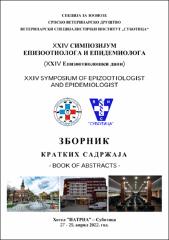Dobra uzorkivačka praksa - preduslov pouzdanog pregleda mesa na prisustvo larvi Trichinella Spp. u mesu divljih svinja

View/
Date
2022-04-27Author
Vranešević, Jelena
Vidaković Knežević, Suzana
Pelić, Miloš
Aleksić Radojković, Jelena
Plavša, Nada
Ljubojević Pelić, Dragana
Metadata
Show full item recordAbstract
Wild boars could be a reservoir of Trichinella spp. for domestic animals, but also a
direct source of human trichinelosis. In most European countries, trichinelosis is rare,
while in the area of the former Yugoslavia (except Macedonia and Slovenia) it occurs
in the form of sporadic or mass epidemics every year, which is why the territories of
Serbia, Bosnia and Herzegovina and Croatia are considered endemic to trichinelosis.
The law prescribes, in all countries of the region, a mandatory inspection of the meat
of wild animals that are intended for consumption. In our laboratory, over 200 samples
of wild boar meat are examined annually with the accredited method "Microbiology
of the food chain - Detection of Trichinella larvae in meat by artificial digestion"
(SRPS EN ISO 18743: 2016). When receiving samples in the laboratory, it happened
that the samples were inadequate (≈ 10%), thus a reliable finding for the presence of
Trichinella spp. was not possible. In order to reduce the number of inadequate samples
as much as possible, our laboratory has issued "Instruction for sampling, transport and
storage of wild boar samples for testing the presence of Trichinella spp. - method of
artificial digestion” which was delivered to hunting societies which deliver samples
of wild boar meat to our laboratory. After that, the percentage of inadequate samples
decreases every year, so in 2018 it was 3.14%, in 2019 1.85%, in 2020 0.42%. In
2021, not a single sample arrived at our laboratory was inadequate.
